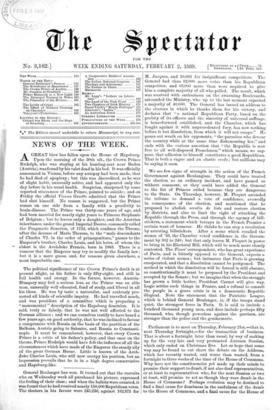General Boulanger has won. It turned out that the recruits
who on Wednesday week all purchased his picture, expressed the feeling of their class; and when the ballots were counted, it was found that he had received nearly 150,000 Republican votes. The electors in his favour were 245,236, against 162,875 for M. Jacques, and 19,683 for insignificant competitors. The General had thus 82,000 more votes than his Republican competitor, and 63,000 more than were required to give him a complete majority of all who polled. The result, which was received with enthusiasm on the swarming Boulevards, astounded the Ministry, who up to the last moment expected a majority of 40,000. The General has issued an address to the electors in which he thanks them for his victory, and declares that "a national Republican Party, based on the probity of its officers and the sincerity of universal suffrage, is henceforward established, and the Chamber, which has fought against it with unprecedented fury, has now nothing before it but dissolution, from which it will not escape." He pours out wrath on his opponents, "the parasites who devour the country while at the same time dishonouring her," and ends with the curious assertion that "the Republic is now free to all well-disposed Frenchmen," which means, we sup- pose, that adhesion to himself constitutes a good Republican. That is both a vague and an elastic credo; but millions may be saying it soon.


































